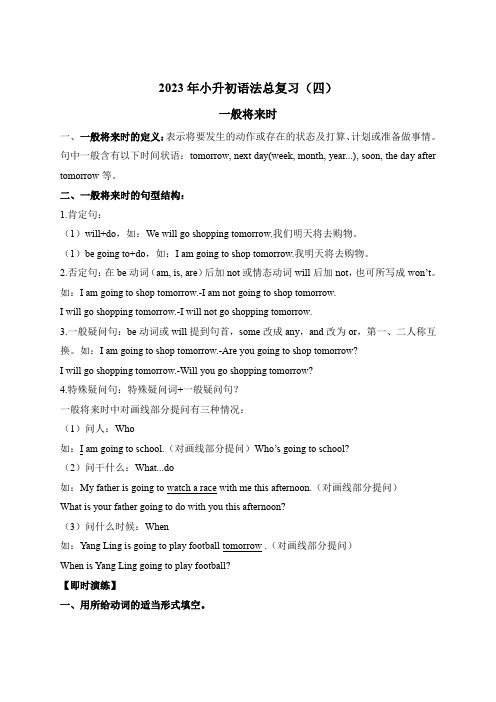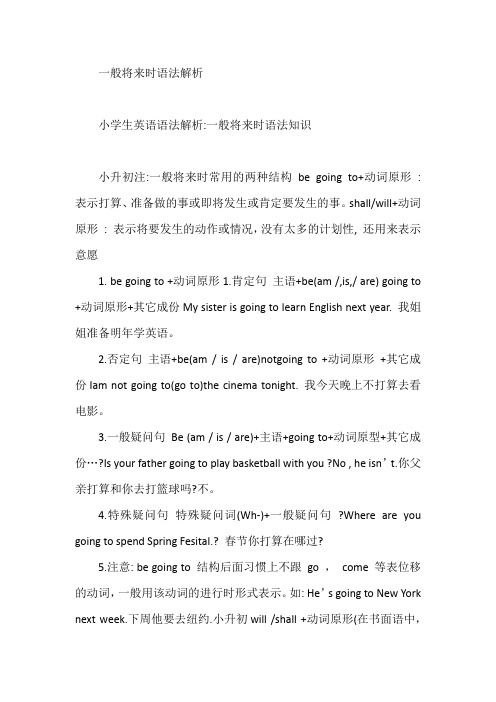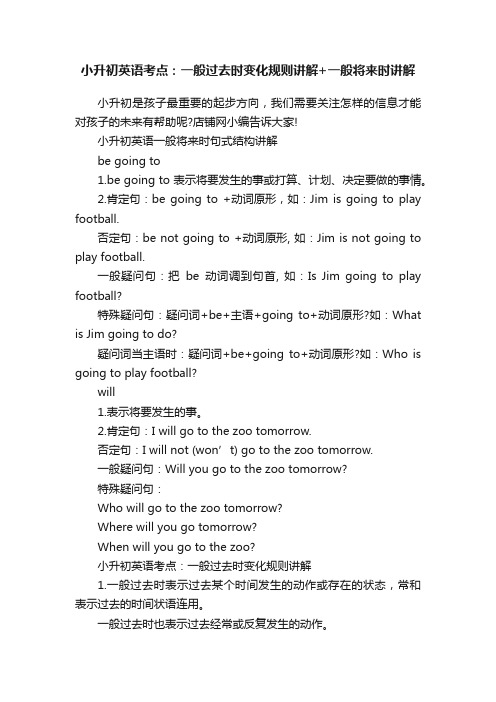小升初一般将来时讲解
2023年小学英语六年级小升初语法总复习(四)一般将来时 (译林版含答案)

2023年小升初语法总复习(四)一般将来时一、一般将来时的定义:表示将要发生的动作或存在的状态及打算、计划或准备做事情。
句中一般含有以下时间状语:tomorrow, next day(week, month, year...), soon, the day after tomorrow等。
二、一般将来时的句型结构:1.肯定句:(1)will+do,如:We will go shopping tomorrow.我们明天将去购物。
(1)be going to+do,如:I am going to shop tomorrow.我明天将去购物。
2.否定句:在be动词(am, is, are)后加not或情态动词will后加not,也可所写成won’t。
如:I am going to shop tomorrow.-I am not going to shop tomorrow.I will go shopping tomorrow.-I will not go shopping tomorrow.3.一般疑问句:be动词或will提到句首,some改成any,and改为or,第一、二人称互换。
如:I am going to shop tomorrow.-Are you going to shop tomorrow?I will go shopping tomorrow.-Will you go shopping tomorrow?4.特殊疑问句:特殊疑问词+一般疑问句?一般将来时中对画线部分提问有三种情况:(1)问人:Who如:I am going to school.(对画线部分提问)Who’s going to school?(2)问干什么:What...do如:My father is going to watch a race with me this afternoon.(对画线部分提问)What is your father going to do with you this afternoon?(3)问什么时候:When如:Yang Ling is going to play football tomorrow .(对画线部分提问)When is Yang Ling going to play football?【即时演练】一、用所给动词的适当形式填空。
一般将来时语法解析【最新】

一般将来时语法解析小学生英语语法解析:一般将来时语法知识小升初注:一般将来时常用的两种结构be going to+动词原形: 表示打算、准备做的事或即将发生或肯定要发生的事。
shall/will+动词原形: 表示将要发生的动作或情况,没有太多的计划性, 还用来表示意愿1. be going to +动词原形1.肯定句主语+be(am /,is,/ are) going to +动词原形+其它成份My sister is going to learn English next year. 我姐姐准备明年学英语。
2.否定句主语+be(am / is / are)notgoing to +动词原形+其它成份Iam not going to(go to)the cinema tonight. 我今天晚上不打算去看电影。
3.一般疑问句Be (am / is / are)+主语+going to+动词原型+其它成份…?Is your father going to play basketball with you ?No , he isn’t.你父亲打算和你去打篮球吗?不。
4.特殊疑问句特殊疑问词(Wh-)+一般疑问句?Where are you going to spend Spring Fesital.? 春节你打算在哪过?5.注意: be going to 结构后面习惯上不跟go ,come 等表位移的动词,一般用该动词的进行时形式表示。
如: He’s going to New York next week.下周他要去纽约.小升初will /shall +动词原形(在书面语中,主语是第一人称时,常用shall ,在口语中,所有人称都可以用will)1.肯定句主语+will/shall+动词原形+其它成份I(shall) write to him next week. 下周我将给他写信。
2.否定句主语+ will /shall+ not + 动词原形+其它成份They won’t watch TV this evening.今天晚上他们不看电视。
小升初一般将来时讲解

四、一般疑问句:
be或will提到句首,some改为any, and改为or,第一二人称互换。
Eg:We are going to go on an outing this weekend.
→
I am going to buy some apples.
→
五、对划线部分提问:
一般情况,一般将来时的对划线部分有三种情况。
_______ ________ meet at the bus stop at 10:30.
9. Sheis going to listen to musicafter school.(对划线部分提问)
________ _______ she ________ ________ _________ after school?
He ______________ (go) to school by bike.
14. What do you usually do at weekends?
I usually ________ (watch) TV and ________(catch) insects.
15. It’s Friday today. What _____she _________ (do) this weekend?
一般将来时教案
课题
一般将来时
教学目标
1.掌握一般将来时的构成
2.掌握一般将来时的用法
3.掌握一般将来时动词的变化规则
重点、难点、考点
1.掌握一般将来时的构成
2.掌握一般将来时的用法
3.掌握一般将来时动词的变化规则
教案
一般将来时的用法
一、概念:
表示将要发生的动作或存在的状态及打算、计划或准备做某事。句中一般有以下时间状语:tomorrow, next day(week, month, year…),soon, the day after tomorrow(后天)next year等。
小升初英语考点:一般过去时变化规则讲解+一般将来时讲解

小升初英语考点:一般过去时变化规则讲解+一般将来时讲解小升初是孩子最重要的起步方向,我们需要关注怎样的信息才能对孩子的未来有帮助呢?店铺网小编告诉大家!小升初英语一般将来时句式结构讲解be going to1.be going to 表示将要发生的事或打算、计划、决定要做的事情。
2.肯定句:be going to +动词原形,如:Jim is going to play football.否定句:be not going to +动词原形, 如:Jim is not going to play football.一般疑问句:把be动词调到句首, 如:Is Jim going to play football?特殊疑问句:疑问词+be+主语+going to+动词原形?如:What is Jim going to do?疑问词当主语时:疑问词+be+going to+动词原形?如:Who is going to play football?will1.表示将要发生的事。
2.肯定句:I will go to the zoo tomorrow.否定句:I will not (won’t) go to the zoo tomorrow.一般疑问句:Will you go to the zoo tomorrow?特殊疑问句:Who will go to the zoo tomorrow?Where will you go tomorrow?When will you go to the zoo?小升初英语考点:一般过去时变化规则讲解1.一般过去时表示过去某个时间发生的动作或存在的状态,常和表示过去的时间状语连用。
一般过去时也表示过去经常或反复发生的动作。
2.Be动词在一般过去时中的变化:⑴am 和is在一般过去时中变为was。
(was not=wasn’t)⑵are在一般过去时中变为were。
(were not=weren’t)⑶带有was或were的句子,其否定、疑问的变化和is, am, are 一样,即否定句在was或were后加not,一般疑问句把was或were 调到句首。
小升初语法辨析一般现在时一般过去时一般将来时(讲义)人教PEP版英语六年级下册

小升初英语语法辨析:一般现在时、一般过去时、一般将来时&专项模拟练习一、一般现在时1.定义:表示经常发生的动作、存在的状态或普遍真理。
2.时间标志词:often(经常)、usually(通常)、always(总是)、sometimes(有时)、every day/week/month/year(每天/ 周/ 月/ 年)等。
3.结构:1.主语(非第三人称单数)+ 动词原形。
例如:You play basketball afterschool.(你放学后打篮球。
)2.主语(第三人称单数)+ 动词的第三人称单数形式。
例如:He playsbasketball after school.(他放学后打篮球。
)4.用法:1.表示经常性或习惯性的动作。
如:I go to school by bike every day.(我每天骑自行车去上学。
)2.表示现在的状态或特征。
如:She is tall and thin.(她又高又瘦。
)3.表示客观事实或普遍真理。
如:The earth moves around the sun.(地球绕着太阳转。
)二、一般过去时1.定义:表示过去某个时间发生的动作或存在的状态。
2.时间标志词:yesterday(昨天)、last week/month/year(上周/ 上个月/ 去年)、ago(……以前)、in + 过去的年份等。
3.结构:主语+ 动词的过去式。
例如:You played basketball yesterday.(你昨天打了篮球。
)4.用法:1.表示过去某个时间发生的动作。
如:I went to the park last Sunday.(我上周日去了公园。
)2.表示过去存在的状态。
如:He was happy yesterday.(他昨天很开心。
)三、一般将来时1.定义:表示将来某个时间要发生的动作或存在的状态。
2.时间标志词:tomorrow(明天)、next week/month/year(下周/ 下个月/ 明年)、in the future(在未来)等。
人教版(PEP)小学英语小升初衔接--一般将来时课件

单项选择
1.Ihope that you__ a good time this evening.
A.have B.are having C.will have D.has
2.Look at those big black clouds. It __rain.Let`s hurry.
A.must B.will
♣I shall be free this afternoon. 我今天下午有空。
4 there will be+ 名词
[注意]:无论后面加单数名词或复数情势,be都必须用原形。
♣There will be only one China in the world. 世上只有一个中国。
♣There will be one chemistry classes tomorrow. 明天有一节化学课。
1 基本结构
肯定句:主语+ will +动词原形+(宾语)+其他. 否定句:主语+ will not (won’t) +动词原形+(宾语)+其他. 一般疑问句:Will +主语+动词原形+(宾语)+其他? 肯否回答:Yes, 主语+will. No, 主语+won’t.
2 基本结构
肯定句:主语+ be going to +动词原形+(宾语)+其他 否定句:主语+ be not going to +动词原形+(宾语)+其他 一般疑问句:Be +主语+ going to+动词原形+(宾语)+ 其他? 肯否回答:Yes, 主语+be. No, 主语+be not.
【口袋书】小升初英语语法知识点-一般将来时讲义(全国通用版)
小升初英语一般将来时讲义一般将来时定义一般将来时表示将来某一时刻的将要发生动作或状态,或将来某一段时间内经常的动作或状态,也表示将来经常或反复发生的动作或事情。
经常和表示将来的时间状语连用,如:tomorrow,the day after tomorrow,soon,next/week/month/year,in the future,from now on,in+一段时间。
一般将来时结构一般将来时的表示方法有两种形式。
①will / shall +动词原形②be going to+动词原形。
shall 用于第一人称,will 用于其次、三人称。
除英国外的说英语的国家,在陈述句中,即使在第一人称一般也用will。
shall not 的缩写式为:shan't, will not 的缩写式为:won’t.一般将来时的用法1)will / shall +动词原形1.表示将来某一时刻即将发生的动作或状态,通常与一些明确表示将来的时间状语连用。
如:They will have a meeting tomorrow.他们明天要开会。
2.表示将来经常发生的动作。
如:Will you often come to see me next year?明年你会常来看我吗?3.表示将来的必定趋势。
Man will die without air.没有空气,人就会死。
2)be going to +不定式,表示将来。
"be going to"中的be是助动词,它有am, is, are三种形式,没有什么实际意义;to是动词不定式的标志词,标志词后动词用原形。
它们三个总是形影不离,在句中共同表达"方案、打算、预备去做……"的意思。
a. 主语的意图,即将做某事。
例如:What are you going to do tomorrow? 明天打算作什么呢?b. 方案,支配要发生的事。
小学一般将来时讲解
小学一般将来时讲解与练习一、一般将来时的定义:一般将来时表示在将来时间将要发生的动作或存在的状态,与表示将来的时间连用。
tomorrow, next day(week, month, year…),soon, the day after tomorrow(后天)等。
如:She will visit Shanghai tomorrow.二、一般将来时的构成(一)一般将来时有两种构成形式:1.主语+ will+do2. 主语+ be going to + do 在表示“打算到某地去时”由于谓语动词go与going重复,一般可以只说be going to a place。
三、一般将来时的用法(一)1.主语+ will+do这种结构不是表示自己的打算、意图或计划,而是表示未来的事实或对将来的预测等如:No one will do heavy work.Roberts will do everything for us.2.主语+ be going to + do这种结构常用来表达自己打算做某事、计划做某事或者有意做某事。
注意:be 动词要与主语的人称和数一致,如:I am going to do some reading tomorrow.He is going to have a piano lesson next week.We are going to have a party this Friday.(二)通常情况下will 和be going to能互换,但是be going to 与will 用法的也是有点区别的1. 只用will不用be going to的情况:①表示对未来时间与年龄的推测时,如:Tomorrow will be Monday.She will be thirteen next year.②表示必然发生时,如:Fish will die without water.People will die if all green plants die.2.只用be going to而不用will的情况:如果表示已有迹象表明在不久的将来要发生的事情时,如:Look at those black clouds, It’s going to rain.(三)某些动词如:go/come/leave/start/begin/arrive等,它们的现在进行时可以表示将来时,如:They are leaving for Shanghaitomorrow.My brother is coming here soon.四、一般将来时的句式变换肯定句:主语+ will+do主语+ be going to + do否定句:主语+ will+not+do(will not 可缩写成won’t)主语+ be+ not+ going to +do一般疑问句:will+主语+ dobe+主语+going to+do特殊疑问句:疑问词+ will+主语+do疑问词+be+主语+going to+do五.巩固练习一、按要求填空1. 我打算明天和朋友去野炊。
小升初英语语法句型转换-一般将来时(全国通用版)
am going to go
will go
1.I am tired. I __________
(go) to bed early
tonight.
2.Mary’s birthday is next Monday. Her brother
_____________(give)
her a present.
(2)否定句:
主语+ be + not going to +动词原形+其他.
如:
I am not going to plant trees this weekend. 这个周
末我不打算去种树。
They aren’t going to climb mountains this week.
这周他们不打算去爬山。
下周你们要去做什么?
—We will have a picnic in the park.
我们将去公园野餐。
一般将来时的用法
1. 时间标志词:
1⃣️tomorrow系列
2⃣️next系列
3⃣️in the future
4⃣️in+一段时间 等表示将来的时间状语。
如:
We will go to Shanghai next week.
week.(改否定)
won’t
go
Shirley ____ ____ to visit her grandma next
week.(改否定)
练习
We will hold a meeting this evening.(改一般疑
问句)
you
Will
____ ____ hold a meeting this evening?
专题10 一般将来时_备战2021年小升初英语必考语法和题型(解析版)
专题10 一般将来时一、一般将来时的概念一般将来时表示将来某个时间要发生的动作或存在的状态。
如:I am going to play football tomorrow.我明天打算去踢足球。
Amy will be 12 years old next year. 艾米明年计12岁了。
There will be a football match in our school next week. 我们学校下周将举行一场足球比赛。
二、一般将来时的动词结构①主语+be going to + 动词原形+其它。
②主语+will + 动词原形+其它。
三、一般将来时的句式结构1. 含有be going to的句型(1) 肯定句:主语+ be going to +动词原形+其他。
如:I'm going to have a picnic this afternoon. 今天下午我将要去野餐。
(2) 否定句:主语+be+ not going to +动词原形+其他。
如:I'm not going to have a picnic this afternoon. 今天下午我将不去野餐。
(3) 一般疑问句:Be +主语+ going to +动词原形+其他?肯定回答:Yes, 主语+be.否定回答:No, 主语+ be + not. 如:例:I am going to have a picnic this afternoon. 我今天下午要去野餐。
(改为一般疑问句并作回答) —Are you going to have a picnic this afternoon? 你今天下午将要去野餐吗?—Yes, I am. 是的,我要去。
—No, I’m not. 不,我不去。
(4) 特殊疑问句:特殊疑问词+一般疑问句?What are you going to do tomorrow? 你明天将要去做什么?例:Sam is going to have a birthday party this Friday. 山姆这周五将有一个生日派对。
- 1、下载文档前请自行甄别文档内容的完整性,平台不提供额外的编辑、内容补充、找答案等附加服务。
- 2、"仅部分预览"的文档,不可在线预览部分如存在完整性等问题,可反馈申请退款(可完整预览的文档不适用该条件!)。
- 3、如文档侵犯您的权益,请联系客服反馈,我们会尽快为您处理(人工客服工作时间:9:00-18:30)。
四、一般疑问句:
be或will提到句首,some改为any, and改为or,第一二人称互换。
Eg:We are going to go on an outing this weekend.
→
I am going to buy some apples.
→
五、对划线部分提问:
一般情况,一般将来时的对划线部分有三种情况。
小升初一般将来时讲解
一般将来时教案
课题
一般将来时
教学目标
1.掌握一般将来时的构成
2.掌握一般将来时的用法
3.掌握一般将来时动词的变化规则
重点、难点、考点
1. 掌握一般将来时的构成
2.掌握一般将来时的用法
3. 掌握一般将来时动词的变化规则
教 案
一般将来时的用法
一、概念:
表示将要发生的动作或存在的状态及打算、计划或准备做某事。句中一般有以下时间状语:tomorrow, next day(week, month, year…),soon, the day after tomorrow(后天)next year等。
_______ ________ meet at the bus stop at 10:30.
9. Sheis going to listen to musicafter school.(对划线部分提问)
________ _______ she ________ ________ _________ after school?
4. 你们打算什么时候见面。
What time _______ you _________ __________ meet?
二.改句子。
5. Nancy is going to go camping.(改否定)
Nancy ________ going to go camping.
6. I’ll go and join them.(改否定)
He ______________ (go) to school by bike.
14. What do you usually do at weekends?
I usually ________ (watch) TV and ________(catch) insects.
3. 问什么时候。When.
eg:She’s going to go to bedat nine.
→When is she going to bed?
4.问要去哪里用 where
We’re going toBeijing.?
→Where are you going?(问句中不要用到to)
他要去哪里
他要去上海。
I ________ play basketball.
3. 你妈妈这个周末去购物吗是,她要去买一些水果。
_____ your mother _______ ________ go shopping this ___________? Yes, she _________. She ______ ________ __________ buy some fruit.
I ________ have a picnic with my friends.
2. 下个星期一你打算去干嘛? 我想去打篮球。
What ________ ________ _________ _________ _________ next Monday?
I _______ ______ _____ play basketball. What _________ you do next Monday?
10.My father and motherare going to see a play the day after tomorrow.
(同上) _________ _________ going to see a play the day after tomorrow.
三.用所给词的适当形式填空。
1. 问人。Who
eg :I’m going to New York soon. →Who’s going to New York soon?
2. 问干什么。What … do.
eg: My father is going towatch a racewith me this afternoon.
→What is your father going to do with you this afternoon.
I _______ go ______ join them.
7. I’m going to get up at 6:30 tomorrow.(改一般疑问句)
________ _______ ________ to get up at 6:30 tomorrow?
8. We will meet at the bus stop at 10:30.(改一般疑问句)
六、同义句:be going to = will
I am going to go swimming tomorrow. = I will go swimming tomorrow.
七.同步练习:
一.填空。
1. 我打算明天和朋友去野炊。
I_____ _______ _________ have a picnic withbe going to + do; ②will+ do.
三、否定句:
在be动词(am, is, are)后加not或情态动词will后加not成won’t。
Eg:I’m going to have a picnic this afternoon.
→
She will come back tomorrow.
11. Today is a sunny day. We ___________________ (have) a picnic this afternoon.
12. My brother _______________ (go) to Shanghai next week.
13. Tom often ______________(go) to school on foot. But today is rain.
